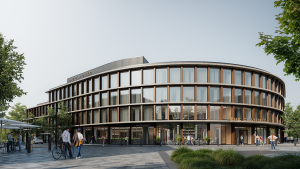In Iqaluit, the capital of Nunavut, a 104-suite hotel and conference centre is being built out of modular rooms constructed on the other side of the globe.
The hotel’s modules are being built by a wholly foreign-owned enterprise (WFOE) in China that was set up by Calgary-based Stack Modular (Stack).
The modules are made out of steel, of which China has large supplies, not wood, the modular material of choice in Canada.
After manufacture in China, the pre-fabricated rooms are shipped from Shanghai through the Panama Canal and up the east coast of North America to Iqaluit (a total distance of 13,100 miles), where Bird Construction is assembling them to make the Iqaluit Hotel.
“It took just over 50 days (almost two months) on the water from China to the job site,” said Andy Berube, Stack’s vice-president of sales and marketing. “There’s a tight, ice-free window – July and August – during which the modules can be shipped by water to Iqaluit.”
Berube says the Iqaluit Hotel project “leverages the benefits of modular construction to deliver a project one year early and under budget.”
“Stack manufactured fully-finished hotel suites — down to the mattresses — and delivered them to the work site,” he said. “Bird Construction, as the general contractor, is managing all the site work – foundations, first floor construction and modular installation.”
Construction of the foundations and first floor structural steel began in late 2018. The Iqaluit Hotel is expected to be completed by March 2020.
Modular construction is rarely more cost-effective on a pure construction-direct-cost basis in a populated urban setting,
— Mark Taylor
Construction Industry Consultant
“The modular units were manufactured and delivered to align with the completion of the first floor,” said Berube. “The 62 units were erected in just 10 days, which allowed Bird to begin the final stages of construction.”
Berube says modular construction of the hotel reduces site disruption and the time it takes to build the hotel, which, in turn, reduces the risk associated with labour, materials supply and weather.
“It also reduces the cost of financing,” he said. “With a 25 to 50 per cent reduction in schedule, we’re quicker to cash flow, and faster capital turn to allocate capital to the next project.”
With Canadian offices in Calgary, Vancouver and Mississauga, Ont. and Asian offices in Shanghai, Jiangsu and Hong Kong, Stack manufactures structural steel modular buildings for the hospitality, multi-family residential, resource, senior and student housing sectors.
Bird is a partner and 50 per cent shareholder in Stack.
“Stack provides the design, supply, manufacture and delivery of the modules,” said Berube. “Bird looks after the site work.”
Stack is the only North American company with its own modular manufacturing facility and supply chain group in China, Berube says.
“Jim Dunn (founder and president) created Stack to leverage a global marketplace and address the challenges of current construction methods,” he said.
Berube says there are good reasons for manufacturing the modules in China and shipping them to Canada for assembly.
“Costs are increasing and construction schedules are getting tighter,” he said. “In China, skilled labour is abundant and it’s cheaper. Much of the supply chain already exists there and Stack is leveraging it.”
Unlike Stack, other North America companies broker with Chinese companies, Berube says.
“We have boots on the ground over there, which is rare,” he said. “Most of our staff — 30 full-time management and staff and 200-300 production staff when we’re making modules — is in China.”
Vancouver Island construction industry consultant Mark Taylor says off-shore modular manufacturers can sometimes, but not always, offer a better deal than their Canadian competitors.
“The main cost components that go into a modular unit are labour, materials, the cost of operating a factory, trucking and the onsite set-up,” he said. “Although Chinese labour may be cheaper than their North American counterparts, their shipping costs in getting here can counteract any labour savings.”
If, says Taylor, the job site is on tidewater close to a port, there will be some advantages to an offshore manufacturer, but, “in the overall scheme of things, this will be relatively minor.”
“In my experience, modular construction is rarely more cost-effective on a pure construction-direct-cost basis in a populated urban setting,” Taylor said. “The cost benefit comes in reduced on-site time, a shorter financing period and quicker revenue generation.
“When you start talking about more remote locations, like Iqaluit, where labour isn’t so readily available, modular costing will be more competitive with the site-built approach, because the cost of bringing in and accommodating workers can be huge. Then the time savings factor can really add to the benefits.”











No way Chinese-built is to code.
100% built to meet or exceed CSA A277 certification.